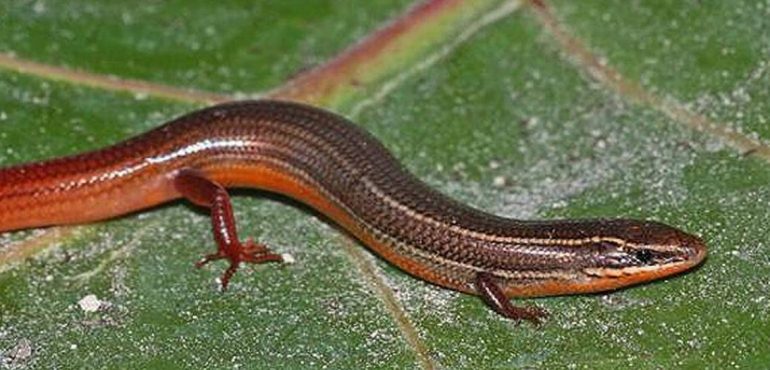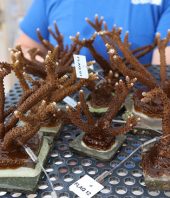A small, shiny, brown lizard with a bright pink tail that lives exclusively on the Florida Keys along narrow strips of shoreline is making a big stink in the nation’s capital.
The Center for Biological Diversity on Monday filed a formal notice of its intent to sue the Trump administration for denying protection to the Florida Keys mole skink under the Endangered Species Act.
According to the center’s release, the U.S. Fish and Wildlife Service denied the skink protection in October despite threats from flooding caused by rising seas, which are expected to inundate nearly half the lizard’s coastal habitat and underground burrows by 2060, the Tuscon, Arizona-based national environmental group said in its statement. Along with climate change, the animal is also threatened by development in the Keys, the center says.
“Without help, the Florida Keys mole skink is definitely headed for extinction,” said Elise Bennett, a center attorney who has been dedicated to protecting rare reptiles and amphibians. “This little lizard’s only home, the Florida Keys’ sandy coast, is being submerged by rising seas and battered by increasingly intense storms. If we don’t curb greenhouse gas pollution, this lizard and so many other plants and animals will be lost forever.”
Miami Herald columnist Carl Hiaasen put the little-known skink into the pop culture lexicon when he named a character in his 1987 book, “Double Whammy,” after the critter. Carlton “Skink” Tyree is the novelist’s fictional former governor of Florida and wild hermit who opposed sprawl. Skink has become Hiaasen’s most iconic character and has appeared in six of his books, including his young adult novel, “Skink: No Surrender,” in 2014.
The center first petitioned for protection of the Florida Keys mole skink in 2010. In 2015, the Fish and Wildlife Service issued a positive 90-day finding by concluding that the skink might warrant the Endangered Species Act’s protections. A court-ordered settlement of a lawsuit filed by the center required the Fish and Wildlife Service to make a decision on whether to protect the skink by Sept. 30, 2017.
The skink burrows in sandy soil to protect its eggs and hunts insect prey under leaves, debris and washed-up vegetation and often goes unnoticed. But despite its low-key nature, the threat of rising seas and intensifying storms, like Hurricane Irma in September, can find the little lizard and, given its existence in such a small geographic area, another major storm like Irma could wipe out its entire species.
“These lizards are struggling to survive on a sinking lifeboat,” Bennett said in the release. “We have a responsibility to rescue them before they’re drowned by rising seas. The center will fight to overturn this unscientific, irresponsible denial and salvage the future for these exquisite little animals.”
Source: Miami Herald, Full Article






